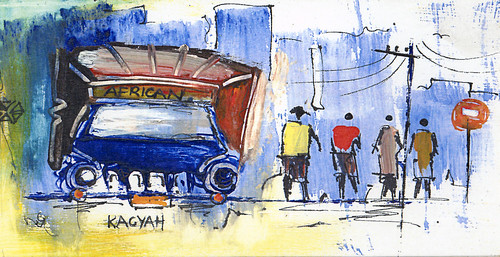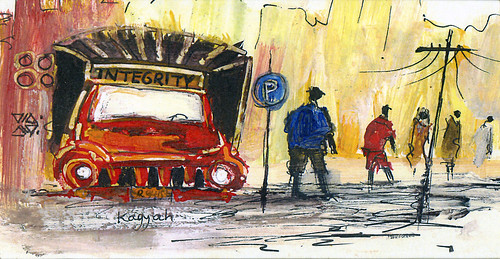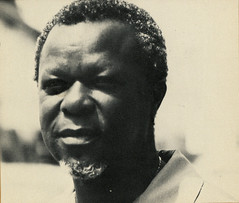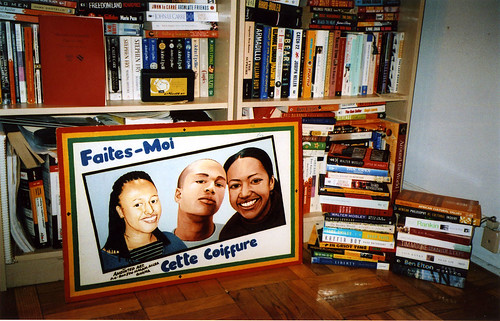The Books of Nima
A note I've been meaning to write for perhaps 6 months to "Sir Sky", the author of The Sea and the Bells; a conversation about Nima, a neighbourhood of the mind.
Part 9 of the Things Fall Apart series, this time an entry under the banner of Social Living...
I was looking over your shoulder during your year in Ghana, perusing your travelogue that I came across in a case of web serendipity (the Ghana tag at Technorati, in case you're wondering). When I first read you, and learned that you were going to be staying in Nima, I was apprehensive. Yours would not be the typical volunteer or expat experience; you weren't destined to have the servants, the driver and car, or the air-conditioned office. I don't know if you knew what you were getting yourself into, that you'd be going local and doing the slum housing thing and worse. As an Accra boy, albeit transplanted to Cambridge, I know all about the school of hard knocks called Nima. It looms large in the Ghanaian consciousness, even if there are many worse places these days as you know. It's very far from ideal as an introduction to a visitor.
The fact that you were willing to give of yourself to us was very generous, and I don't know if Ghana fully reciprocated the generosity... The years from 1982 to 1988 broke the back of the Ghanaian people, and ever since, we've been struggling to recover from scarcity and arbitrariness. Thus we demand a lot of outsiders and of anyone who's been abroad. This is changing, and our current quiet stability is restoring our confidence in parts; still, not everyone has read that script, and the neediness can wear you down. For what it's worth, you're not the only one labelled oburoni; my mid-Atlantic self gets that designation every now and then when I'm home.
I was tempted at many stages to jump in: to suggest creature comforts or avenues that would have made things less wrenching for you. But as is the norm on this web, I remained dark matter, absorbing your energy. Still in mitigation of the head nods I omitted to send your way, I think your experience is all the more richer for being yours alone. Like your country's peacekeepers, you are one of Canada's great exports, and after your experience in Ghana, you'll breeze through anything back home.
You lived through countless lights out and experienced the wasted time spent dealing with simple things like water, food and transportation. And of course, there were those untrustworthy and maddeningly inconsistent people... It's the simple fruits of poverty; we lack infrastructure, physical and otherwise.
You had the daily struggle in that library without resources, where you taught the adult literary classes and wrangled to teach those neighbourhood children. The ironies and absurdities about that task are worthy of a novel and hopefully you'll write one.
Osu library was the scene of some of my fondest memories of my childhood. It was well stocked and the librarians cared and worried about you. No one could ever tear me away from it, even at closing time. It was where I learned that books and ideas are important, where the parental challenges were investigated and puzzled over. Those books were a long winding road, to be read with care as their nuggets would reveal themselves, or the inconsistencies of an argument would appear in relief in the reading light. My greatest heartache about Ghana today is that very few children are getting the same opportunity. True, our lingua franca these days might be radio, television or this internet thing, but really, how many Ghanaians are participating in this conversational web? If only I could hear those missing voices... The notion that so few in my country can bury their heads in books on weekday afternoons or on a lazy Saturday morning at the library is cause for much distress. And don't get me started about what's happened to the Legon university bookstore. Must everything be utilitarian? Is a country without whimsy worth worrying about?
I think the emotional violence could have been avoided, and, certainly the physical violence should have been avoided. My heart leaped at such times, but still I kept silent and read on. Nima is such an insular place, it is very wary of outsiders as you probably found. In the past it was where rural migrants came to partake of the Accra dream in the Gold Coast. Thus it has always been messy, and developed in fits and starts as befits the residence of those who live on the fringe.
Even today, two shacks away from the homes of proud middle-class schoolteachers you'll find the "Nima boys", selling 'wee', guns or worse, right under the Kanda highway and close to the police station. The boys can always be counted on to roust any political opposition come election time, and their hard knocks usually come for cheap. True, the stereotypes of Nima boys as uncouth, brash, vicious, and ill-educated are extreme, but they carry a kernel of truth about a small minority that lingers even in the relative prosperity of the moment. Across is a chop bar serving the best banku and fetri in town; Auntie Maggie's spot is packed during the day and there's nice fresh tilapia at night, shantytown chic as it were. Just around the corner is a drinking spot with people playing oware or dominoes and downing bottles of Star beer and Guinness in the early evening. Nowadays there are the occasional interruptions when they'll whip out the latest mobile phone ostentatiously: "talking loud and saying nothing".
But you saw all that and more, you saw how people "disciplined children" and how they meddled in each other's business — or not. As you found out, that "it takes a village to raise a child" business isn't happening much in the slums of Nima; too often it is the garden-variety anomie and indifference of urban life, something that wouldn't be out of place in any big city. I saw the same mix in Soweto a decade ago, although that was more upscale at the time, and well, Inman Square is what it is. It is true that given a few decades of development, Nima could become the Catford of Accra, and, believe it or not, it is much better today than it was in the sixties and seventies, but perhaps that progress is cold comfort for the struggles you faced.
I dug your observations on the press and on street life of Accra. Your look at the street cleaning exercises that took place earlier in the year was priceless. In the year 2006, they're finally worried about rubbish and overflowing gutters! And only for two weekends. Ah yes, that culture of maintenance that was so evident in your encounters with us. Perhaps you too have the journalistic impulse. And that water shortage in certain parts of town, Accra is straining at the seams; I was in Ghana at the time and noted as much, although we had water in our neighbourhood. You picked up on our tro-tro wisdom, our folktales, and the languid way in which we view the world. You even taught me that proverb from Northern Ghana:
"Trust God implicitly but always tie your camel up at night."I don't know if that's where Ronald Reagan got his "trust but verify" shtick, but it's close. Still, Kweku Ananse's cunning and laziness can be a curse; living by your wits, hustling in short, is no substitute for the prosaic work of development, although it can be quite enjoyable.
I suspect that a lot of Ghana has rubbed off on you; we can be quite infectious (and not just in matters of public health). Do be careful that you don't break out into pidgin when you're back home interviewing for a job; our deconstruction of the English language has its own musical logic, and not everyone is ready for it.
Take care-oh.And you saw the other side too, the havens of those expats who saw Ghana as a holiday, who kept to themselves and didn't engage with the country and its people. Hell they might as well have been living in Eden; your garden was good old Nima. Well at least you got to know us intimately; that has to count for something. We claim you as our soul sister, and will keep your heart hostage in our town.
You even reported on the beginnings of the cholera outbreak that I encountered last Christmas. When my father began to warn me about taking precautions if I decided to eat out in town, I nodded my head knowingly; for a time you were my favourite Ghanaian newspaper.
And of course there were those malarial episodes, the fevers, the Larium dreams and those hallucinations. How much energy was dissipated in those sweaty nights and days? Those mosquitos, and their cargo of plasmodium falciparum; they are a poverty tax. We may throw our herbal medicine and "bitters" at them, but that is after the fact, to deal with the symptoms. The full panoply of mosquito nets, sprays and lotions counts for nought if you don't deal with sewers and the ever-present pools of stagnant water, or if parents will use their children's nets. And we all know about drug resistance: Darwin's evolution is intelligent design. Still, as they say, mosquitos don't discriminate. Not in Ghana, not on the island of Reunion, and certainly not in Cambridge. We're all singing the West Nile Blues these days. Some call it globalization; I know it as the Mosquito Principle.
You may only have lived in Nima for a while but you got the full Ghanaian experience, unvarnished and cacophonous; three centuries taking place simultaneously in those twisted back alleys. I'll admit to a sense of wistfulness in seeing my country anew through your eyes, and I want to hear more of your thoughts going forward as you carry Ghana in you. I hope we don't weigh too heavily on you. I wish I had been there on the ground; it's hard to be living vicariously through a Canadian woman.
As you'd expect, it's very painful for me as a proud Ghanaian that, almost 50 years after independence, we are still relying, nay depending on you, to teach us how to read, or even to school us about the importance of a book. To read, for God's sake. Hundreds of years after our chiefs started sending their children to Europe to learn these things and we haven't internalized the lessons... But then it works in the other direction, the West relies on people like me to make sense of its world - the technology world in my case. And your southern neighbour, that United States of Anomie, can be a similar school of hard knocks, and not just for lowly immigrants; you don't need to visit New Orleans to get the daily evidence. Still, I wish the cultural interplay was more balanced, that we could each walk tall, rather than smile sheepishly as we do and say, "Only in Ghana" or "That's how it is in Ghana". As if we can't do anything about it. As if it doesn't have to be this way.
You quoted Anthony Hopkins playing C.S. Lewis in Shadowlands:
"Experience is a brutal teacher. But you learn. My God, you learn."I'll suggest in response, our poet Kwesi Brew's book, African Panorama, and I'll quote one of his elegiac poems. You should recognize the subject matter.
The Slums of Nima
Three neighbours met,
And after a hurried, "I give you rest"
The two young men stood aside for the old man
to pass and then picked their way
in the opposite direction towards the alley on the left.
They were thieves who robbed with violence
But still they stood aside for the old man
And he thanked them.
In a bereaved world questions and comments
Fall on unhearing ears.
Only silence, understanding and
Belonging can put
A blind man's stick in the hands
Of a searcher in that night.
The crumbling walls have leaned
On their chests for decades!
The toll of breathing has shredded
Their lungs, and their eyes are sore
With the smoke of the wicker lamps.
And now we all stand at the edge
Of an abyss
Afraid to plunge headlong, or
Return to the dark of the night with them!
Ghanaians are natural storytellers. We are cultural interpreters and urban griots; not for us Anglo-Saxon brevity. Even as we consider Kwesi Brew's abyss, or that heart of darkness, you'll hear the musical laughs and see our urge to understand. We want to change the perspective and open things up through observation and humour. As he wrote in another poem, and I won't give the punchline away, things must be sweet for Ghanaians:
How else could they laughIt is quite poetic that you arranged for your class to travel outside Accra - to the beach no less, and even managed to get them that helicopter ride over the city. We are all so caught up in our black boxes, strangers in our own country. It is eye-opening to glimpse those different perspectives, and you too were being a cultural interpreter, making people see themselves anew. It was a small victory in your ongoing journey.
Like they do when they should weep;
Remembering the voiceless days of the past.
I really hope you don't take your journal down as you threatened recently. The pearls of experience therein are too rich to be simply discarded in the dustbin of the lost web. Allow Google to stumble over your throwaway experiments - they provide comfort even for an audience of one. I dug a lot of the writing (without a doubt, you're on the road to many books). The sound of a voice trying to make sense of an unfamiliar, frustrating yet endearing environment, the large and the small observations, all these things make for a historical document done in best tradition of the web style. The Sea and the Bells, at least that year's version, is a great snapshot of Ghana in the years 2005-2006, a personal introduction to be sure, but it constitutes a compendium of small things to be duly celebrated.
As you might guess, my preferred response to Things Fall Apart is small things: short cuts and bite-sized conversations that engage in the marketplace of ideas. I know you only as "Sir Sky" and the conversation has been one-sided until now. Consider this my opening gambit, my "so what's your name?" approach. I hope you like my brand of small talk; it's known as toli.
Dig: I'm sending some books to the Osu library. I hope it's still there and that someone will receive them. I can only hope that people are still reading. I've been carrying them all these years but never did anything about them; they make a glorious floorscraper. They'll be delivered in your name, and inscribed with the word Nima.
A belated head nod to you.
Next: Dilemmas.
See also: Poetry as Cultural Memory
File under: Ghana, Nima, Accra, Africa, life, experience, urban, slums, conversation, literature, poetry, Kwesi Brew, web, serendipity, observation, culture, interpretation, development, infrastructure, glue, perception, history, Canada, globalization, essay, wist, Social Living, Things Fall Apart, toli






11 comments:
So is the answer to Ghana's, and Africa's problems, to modernize, become better capitalists, better readers, etc. - basically embracing Western values and culture and influences? (Capitalism is a Western idea now sweeping the world; it can destroy traditional communities and ancient ways of life in its path). Or is the answer to look towards a traditional African way of life? If capitalism is chosen, Africa will take a century or more to catch up. It is failing miserably in this regard. But why should Africa embrace another culture's way of life, rather than find its own way?
So you think Africans are better off embracing Western Capitalism, rather than finding their own way of doing things? Everyone is judging them by Capitalist standards, at which Africa has failed miserably. Even where it has worked in traditional societies (e.g. India, China) it has been at the expense of traditional family structure and ways of life. The sacrifice has been great, perhaps too great. Maybe a better solution would be for Ghana, and Africa in general, to find its own path, drawing on its unique cultural heritage, rather than trying to be another "developed" country.
I'm always glad when others pipe up and question, because the answer, if indeed there are answers to the above questions, is conversation. If you've noticed, I offer more questions than answers. A plea for more reading in Africa is a proxy for a plea for more considered thinking. It is only a recognition that in a global conversation about ideas and the practicalities of life, it helps to come prepared.
The phrase I'll highlight in response is cultural interplay, I really do wish it were more balanced.
It is interplay that concerns me because every culture is at the boundary of traditon and modernity and we are always picking and choosing how we deal with things. You can read several thousand words all over this blog meditating on this issue - a penchant for verbosity is one of my failings. Indeed even in this series I was considering Nkrumah at independence and the choices that were made. Were they wise?
But even further back, the chiefs in the African past faced these same dilemmas, is mimicry the best response? Or is it a pragmatic case by case weighing of issues? We picked up writing systems when they were shown to be practical for us, for trade, for the preservation of knowledge and whimsy for future generations. And of course we have our own things to contribute in the marketplace that others may choose to adopt.
I'd also like to move beyond the leadership, what about the people? Leaders come and go, with policies sometimes progressive and other times reactionary and downright destructive. How do we best equip ourselves in this narrative?
And not to telegraph my intentions or to put it too programmatically, the reason I put this entry under the banner of social living is that this theme is something I want to investigate further filtered through the lens of Ghana, Africa, literature, movies, history, technology etc. There is a long tradition of cultural interpretation at work and I've barely scratched the surface. And what are the effective strategies in this debate? Some cultures seem to do better than others, why is that? And what can we learn?
And true, it would be sad if the endpoint for Ghana is just to be a Southern California with soul which by the way is how people are starting to look at South Africa... I think there is a richness in our traditions and history that belies such a reading.
My current answer is to focus on small things. Everyone has their ideas in this debate but often it is simply projection. Who is writing the script? I want to change the perspective.
I'll acknowledge that there are both cultural universals and particulars and I'm all for the local concerns. However the external influences are universal. Here I called it the mosquito principle and perhaps I will expand on that notion further in furture conversations. Still:
Public health is a universal concern. The slums of Nima are the same as Mexico City or the favelas in Brazil.
Human rights are a universal concern whether in Abu Ghraib or Somalia.
Democracy is a universal concern from Ukraine to Ghana, from Nepal to the USA
Technology adoption is a universal concern... the most interesting phemenonom currently is tjat Africans en-masse are adopting mobile telephony and doing it even faster than the Chinese or Indians. The communication imperative is a universal, we all need to trade and stay in touch, why didn't we pick these technologies up earlier?
The heart of darkness is a universal concern, for every Milosevic, we Africans seem to have had a cocktail of Charles Taylor, Foday Sankoh and those genocidaires of Kigali and yet it is the same stew of collateral damage and the neighbour's house on fire.
And lastly if things fall apart is a universal concern, what are the coping strategies?
This is a conversation and I don't think Africans or even Americans can afford for the roundtable to consist solely of rogues like Ronald Reagan, Jonas Savimbi, George W. Bush, Dick Cheney, Donald Rumsfeld, Osama Bin Laden, Hugo Chavez and the like, well you have your own notions of demagogues and opportunists...
The grass needs to a have a say in the concrete jungle of the 21st century or the shantytowns of the mind. Nima is a good starting point, I'm inviting my heroes to the toli roundtable at the blogospheric chop bar, it's a modest joint to be sure and who knows if the other diners will even notice us or deign to temper their loud-mouthed presciptions. But who cares? It's a conversation worth having in any case, the connections and explorations are their own reward.
Akwaaba. What can I get for you to drink? Pineapple juice or palm wine?
It's the voices inside that matter...
Sorry for repeating my question. I thought the first time it was lost. Do you ever consider the fact the most educated, intelligent, and (presumably) ambitious Ghanaians like yourself leave the country to be part of the problem? People like you are exactly what Ghana needs. I am not a Ghanaian or Africa, I just spent some time travelling and volunteering there. And for the drink, pineapple juice sounds great.
Cheers, the drink will be right out... I wasn't sure which "Anonymous" I was responding to hence the broad brush. Or was it a chorus of one?
Not to be facetious, but this last question, the diaspora dilemma, is one I ask myself daily, I've phrased it as follows:
"Why can't we be like the Indians for whom it increasingly makes a lot of sense to stay put back home or to even head back from abroad?"
I ducked the question last year when Chris Lydon similarly pressed me on it. Suffice to say that it weighs heavily on my mind. Truly, being mid-Atlantic is not easy and there are stories to be told about exiled souls and journeys past and present. I keep stumbling towards an answer like the old man of the above poem, in the alleyway trying to head home, faced with the prospect of hard knocks. I hope they'll let me pass...
Anyway, returning to the chop bar metaphor, I have to save something for desert. Honest, I'll try to address your question. Will you stay until then? I've got jollof, kebab and kelewele for the main course or are you one for yam and garden egg stew?
I'll be around.
I also have many questions, about the best way to help Ghana, and Africa in general.
Do you think all of these NGOs are helping a lot? A little? More harm than good? I also volunteered at the library in Osu, before "Sir Sky", but in the same place. However, I was there for less than a month, and didn't experience the same hardships. I am now back in the US, doing very well in business, and thinking about setting up some kind of scholarship fund. I would contribute to an existing one, but I am not sure if that is better.
there's no question that you're a brilliant guy. Your erudition is vast, yet your blog is virtually unreadable. Perhaps I'm being a philistine here, I'm minded of the apocryphal retort attributed to Mozart when he was asked by the King to cut out a few notes here and there, but you need to shorten the material and organize it better. Sorry, but if you're interested in reaching a wider public meaningfully, I don't see how this overly exuberant outpouring will help you achieve that.
Re: helping Ghana or Africa in general. Who knows what works? Government to government sometimes works but is often squandered since hidden agendas and rogues abound. Given the amount of money that has passed through Nigeria in the past 50 years and its current state, I'd suggest an International Criminal Court or something. The reaction has been a move to reliance on NGOs and such in the past 20 years. Still aid in general distorts and creates dependency. Person to person sometimes works, that's the bulk of the diasporic contributions. Still, remittances may pay school fees (sometimes) but they don't build roads and at the macro level, it's infrastructure and redundancy that is lacking. Ultimately change must come from within and perhaps we're close to such change these days; there are so many opportunities in Africa, it's the last frontier as it were. At our current stage of development we'll take any little bit of help acknowledging the costs with our eyes wide open. It's a marketplace, perhaps your ideas are better than others.
To KBlanko:
Cheers. You should see what I left out, and I don't just mean the soundtrack... Still I'll take praise, however faint... Mozart huh?
The point is well taken regarding brevity and the necessity for editorial discipline etc. If you've hung around this joint, you'd realize that it's a longstanding concern and request: ergo succumbing to the temptation of entertainments rather than focused monographs, a cacophonous and irreverent take on the world and the Proust effect.
And yes, I should probably only listen to one voice at a time... As someone advocating small things, verbosity is paradoxical I suppose... It's only that I have a roving mind...
How did I put it before? "This is a someone's voice you are hearing, engaging and thinking aloud in public conversation."
I hear you though and perhaps its worth fixing things structurally (and I will) and editorially (perhaps)... Who's the audience for this blog anyway? In any case, here's to more conversation, and hey, welcome to the toli.
What would be a good business to start in Ghana now? This could also be a way to generate employment for locals. Or should I just stick to sending money? I was frustrated with the work ethic and dishonesty of the one Ghanaian I employed to do some computer work for me while I was there. I don't want to generalize of course, but labor must not only be cheap, but good. Otherwise, it is better to pay Western wages and get it done. So, as an American businessman who loves Ghana, and misses it, do I just keep sending money or do I go and try to start some business there? (Something which would require occasional visits, but not my full time presence, as I don't plan to become an expat). Any ideas?
Kblanko, he is a writer, not a politician. Let him write. Sure, he can be a bit long-winded, but this is HIS blog, after all. His opportunity to express himself. This is not a forum to change the world, and I hope he doesn't believe that (and that you don't either). Let a writer express himself freely on his own electronic diary. We should be grateful that he is letting us have a voice in this discussion taking place in his own space. Are you the kind of person who also complains about the cooking when you are a guest at someone's house?
Koranteng - will be good to read your answer to the question of going home.
For me its quite simple - I am convinced that the solution to our problem is not to follow blindly but rather tackle our problems with basic research. Thus, all I require from the western world is the training that comes along with a Phd.
To the anonymous who asked about sending money:
Don't stick to sending money. Business is the way to go - and you don't need to come up with one from scratch. Just find self-minded individuals and start a conversation ...
Post a Comment